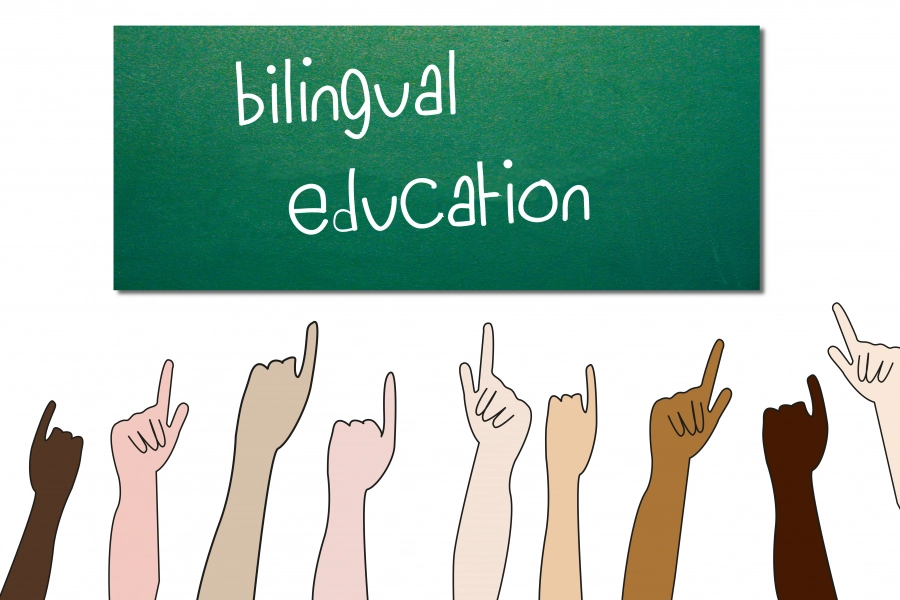


From bilingualism to plurilingualism
What is bilingual education?
Bilingual education involves the acquisition of linguistic skills in two languages, leading to a new level of perception and behaviour. According to François Grosjean, a leading Swiss academic specialising in bilingualism, bilingual individuals are not simply the sum of two monolinguals, but rather possess a unique linguistic configuration. They actively, if often unconsciously, manage their attention between the two languages, making them interact to form a complete linguistic system specific to each individual.
A bilingual school prepares children in a unique way for their school career and future life, by developing much more than just their language skills.
From an early age, learning a second language promotes children's cognitive development, as can be seen with hindsight from a practice that has become almost systematic in international schools. Bilingual children tend to be more creative, to have better problem-solving skills and to be more flexible in their thinking - invaluable skills for tackling the intellectual challenges they face at school and in later life.
The linguistic advantages of a bilingual school
In practice, here are the main skills that teachers and educational directors can observe in pupils attending a bilingual school:
Linguistic and cognitive advantages :
- Mastery of two languages: Learning two languages at the same time enables children to develop a natural linguistic competence in both languages, since they are studying a common curriculum and therefore common concepts.
- Enhanced cognitive development: Bilingual learning stimulates memory, concentration and problem-solving skills.
- Better communication skills: Bilingual children are more at ease communicating and adapting to different cultures.
Preparation for college and working life:
- Ease of adaptation: Bilingual children adapt more easily to new environments, an asset for college and professional life.
- Better chances of success: Proficiency in several languages is an asset on the job market.
- Opening up to the world: Bilingualism allows children to discover other cultures.
Personal and social development - Self-confidence :
- Mastering two languages boosts children's self-confidence.
- Open-mindedness: Bilingualism fosters tolerance and respect for differences.
- Friendship and collaboration: Bilingual schools offer a multicultural environment conducive to friendship and collaboration between pupils from different backgrounds.
- Expanded career opportunities. Employers value communication skills in another language and the ability to work with foreign partners. Pupils from bilingual schools therefore have a professional advantage over their peers.
- Opening up to international careers. A bilingual education provides an in-depth knowledge of foreign cultures and languages, which can facilitate an international career.
Many companies are looking for employees who can communicate effectively with foreign colleagues and customers.
Savio Education schools: the choice of bilingualism from the age of 2
Choosing to enrol your child represents a major opportunity to better prepare them for the future, even for families with dual nationality.
Here are three reasons why you should join a Savio Education group school:
1 Early language immersion
Early learning of a second language is encouraged from nursery onwards in bilingual schools, providing children with an environment conducive to the acquisition of early bilingualism. Unlike traditional education, where the emphasis is on formal language learning, bilingual schools encourage daily immersion in the chosen language. This immersion from an early age gives children constant exposure to another culture, fostering their socio-emotional development.
2 Teaching approaches that encourage autonomy
Bilingual schools often adopt innovative teaching approaches. At Savio Education, the emphasis is on children's freedom and autonomy in their learning. This approach allows children to choose their activities, to progress at their own pace and to share their discoveries with their peers. This freedom encourages responsibility and autonomy, stimulating their enjoyment of learning and their acquisition of skills.
3 A window on the world
A bilingual school broadens children's horizons by opening them up to the world and raising their intercultural awareness. By learning a second language, they are exposed to new cultures, perspectives and ways of thinking, which helps them develop empathy, tolerance and the ability to work with people from different backgrounds. At the Saint Dominique Savio school in Lausanne, for example, 70% of pupils are of different nationalities.
Bilingual education: a strategy that pays off
The benefits of bilingual education are clear from the data. According to a study carried out by the Center for Applied Linguistics (Beatriz Arias, 2021), students who follow a bilingual immersion programme perform better academically than their monolingual peers. In fact, these students have demonstrated a greater ability to solve complex problems, think critically and adapt to multicultural environments. What's more, the advanced language skills acquired through a bilingual education open up invaluable professional doors. According to a survey conducted by the Pew Research Center (2020), multilingual people earn higher salaries on average than those who speak only one language.
Beyond the individual advantages, a society with a bilingual population also benefits in many ways. Studies by the Organisation for Economic Co-operation and Development (OECD) have shown that countries where bilingual education is encouraged often have lower unemployment rates and stronger economic growth. In addition, linguistic diversity fosters tolerance and intercultural understanding, which are essential elements in building inclusive and harmonious societies.
In conclusion, investing in bilingual education is an investment in the future, both for individuals and for societies as a whole. As the famous Chinese proverb puts it, "Learning a language is like having another window through which to look at the world."


